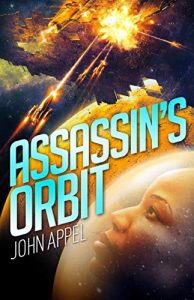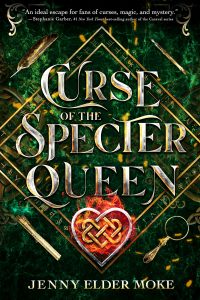Liz Bourke Reviews Assassin’s Orbit by John Appel
 Assassin’s Orbit, John Appel (Solaris 978-1-781089156, £8.99, 430pp, pb) July 2021. Cover by Amazing15.
Assassin’s Orbit, John Appel (Solaris 978-1-781089156, £8.99, 430pp, pb) July 2021. Cover by Amazing15.
John Appel’s Assassin’s Orbit is another debut. This one suited me much better than For the Wolf, but then women in their sixties kicking arses and taking names while having complicated interpersonal interactions is pretty much my jam. Appel handles a diverse cast with future versions of religious faiths (Islam, and I think – though I’m far from an expert – a religious faith descended from West African influences) well. Queer is normal. Appel’s science fictional future reflects, in its people, the world I actually live in, and that makes me predisposed to like it all the more.
The planet Ileri (and its space-based stations) is shortly to vote to join a larger polity, the Commonwealth. But the bloody assassination of a government minister and a foreign diplomat threatens to throw a spoke into the works. Matters only grow more complicated when a technology inspection team (with a warship) arrive from the Republic of Salju, on the trail of forbidden technology – the same technology that led to the wars that caused the abandonment of Earth. The conspiracy, a coup, fighting in the streets: the crisis rapidly mounts to giant proportions.
In the middle: private investigator Noo Okereke; Meiko Ogawa, a spy whose career is on its last legs; and Nnenna Toiwa, career police and anti-corruption reformer who is now commissioner of police on the space station where the murder took place.
Okereke is one of a handful of licensed private investigators on the space station. The grandson of her business partner – the brother of her work partner, a young man as close to her as any of her own children – was bodyguard to the murdered minister and died doing his job. When she identifies the body, she’s determined to bring the killers to justice – or at least to get revenge. And she is not too old for fieldwork.
Ogawa has a 40-year career, but her track record of success was marred by disaster and tragedy on her last mission. But she still has contacts on Ileri station, and her superiors consider her the best placed currently to try to investigate the murder of their diplomat in advance of the plebiscite. Her enquiries lead her into an ambush – and a conspiracy – and blow her cover entirely with the Ileri authorities. They also converge with Okereke’s, and with Police Commissioner Toiwa’s, so that she becomes part of an officially-constituted task force that’s pursuing a lead on-planet just as the Ileri opposition to joining the Commonwealth launches a coup.
Commissioner Toiwa is only a couple of years younger than Okereke. She’s strongly anti-corruption, and in the short time she’s been commissioner on the space station, she’s swept through the ranks of the police force, getting rid of the corrupt, cracking down hard on less-than-upright behaviour, and generally bringing in a reforming efficiency. She has a fairly jaundiced view of private investigators and foreign agents interfering in her investigation, to say nothing of their contacts with the criminal underworld that had a cozy arrangement with her predecessor, but when it becomes clear that there’s a far-reaching conspiracy at work, she folds them in to her task force and hopes that they’ll achieve results.
All three of these women – and other characters who have a less striking impact on the narrative – are compelling, interesting, entertaining figures, even Toiwa, who at first (and according to the conventions of most science fiction thriller narratives) seems like a rulebound stick-in-the-mud. But when the coup breaks out and Toiwa finds herself and her handful of loyal police officers with their backs against the wall, we see the fundamental importance of her ethics and her integrity.
At stake, in addition to Ileri’s democratic entry to the Commonwealth, is the spread of a dangerous mind-control technology, one that could be aerosolised and spread like a plague – a technology that could spark a terribly destructive war, if Okereke, Ogawa, and Toiwa can’t stop it in its tracks.
Assassin’s Orbit is a compelling, explosive debut. Fast-paced and complex, its layers of multiple competing agendas only get more interesting, and its protagonists – cranky, uncompromising, old enough to have any number of skeletons hidden under their floorboards – come across as very interesting people. It’s a really entertaining book. I couldn’t put it down.
Liz Bourke is a cranky queer person who reads books. She holds a Ph.D in Classics from Trinity College, Dublin. Her first book, Sleeping With Monsters, a collection of reviews and criticism, is out now from Aqueduct Press. Find her at her blog, her Patreon, or Twitter. She supports the work of the Irish Refugee Council and the Abortion Rights Campaign.
This review and more like it in the August 2021 issue of Locus.
 While you are here, please take a moment to support Locus with a one-time or recurring donation. We rely on reader donations to keep the magazine and site going, and would like to keep the site paywall free, but WE NEED YOUR FINANCIAL SUPPORT to continue quality coverage of the science fiction and fantasy field.
While you are here, please take a moment to support Locus with a one-time or recurring donation. We rely on reader donations to keep the magazine and site going, and would like to keep the site paywall free, but WE NEED YOUR FINANCIAL SUPPORT to continue quality coverage of the science fiction and fantasy field.
©Locus Magazine. Copyrighted material may not be republished without permission of LSFF.




